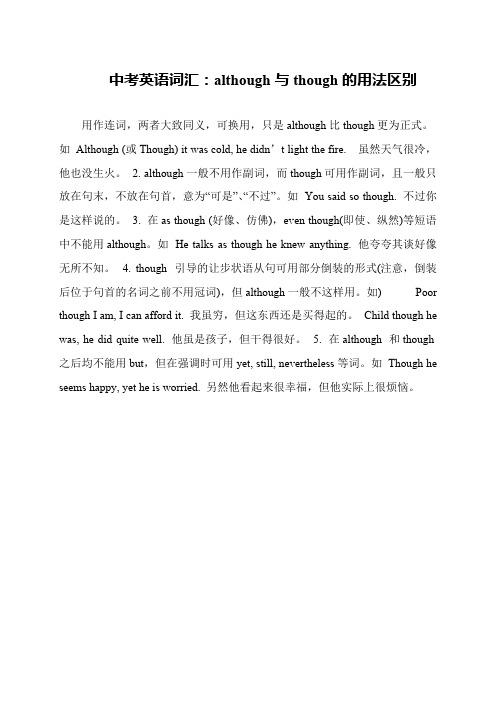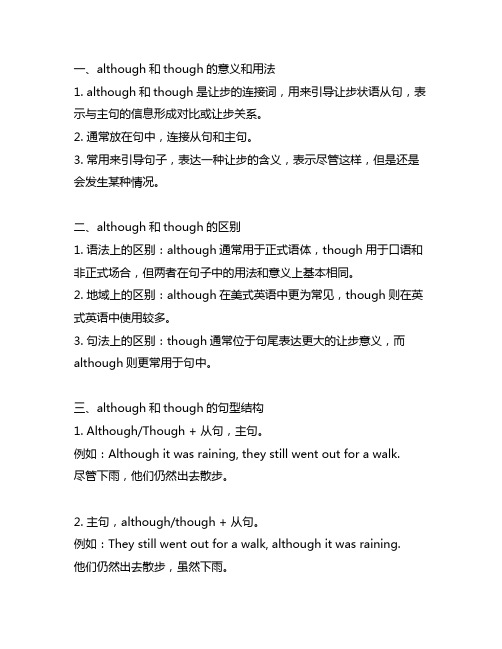高中英语as though althoug 引导让步状语从句的区别
英语语法as引导让步状语从句

英语语法as引导让步状语从句这是CN人才网小编准备的英语语法as引导让步状语从句,快来看看吧。
一、1、在引导让步状语从句的从属连词中,比较常见的有although, though, even though, even if, whether…or…等。
2、另外,以-ever结尾的连词如however, whatever, whoever, whenever, wherever等也可引导让步状语从句,其用法相当于no matter…。
3、注意,while和when除用于引导时间状语从句外,有时也可引导让步状语从句,其意为“尽管”“虽然”。
二、除了上诉常见的从属连词引导让步状语从句外,as 也可以引导让步状语从句,但是,as引导的让步状语从句必须以部分倒装的形式出现,被倒装的部分可以是表语、状语或动词原形,though也可用于这样的结构中,但although不可以这样用,例如:引导让步状语从句时,as意为“虽然…但是”,“纵使…”之意”,“尽管”,通常从句要倒装,倒装的方法是将从句的表语或状语放在as之前,而用though引导让步状语从句时句字则不必倒装(口语中也可倒装).1. Heavily as it was raining outside, they started out very early.尽管外面下雨非常厉害,但是他们早早就开始了。
2. Young as he is, he knows a lot=Though he is young 或Young though he is, he….他虽然年轻,但懂得很多。
3. Object as/though you may,I’ll go.(=Though/Although you may object,I’ll go.)纵使你反对,我也要去。
4. Hard as/ though he works,he makes little progress. (=Though he works hard,he makes little progress.)尽管他学习很努力,但几乎没取得什么进步。
中考英语词汇:although与though的用法区别

中考英语词汇:although与though的用法区别
用作连词,两者大致同义,可换用,只是although比though更为正式。
如Although (或Though) it was cold, he didn’t light the fire. 虽然天气很冷,他也没生火。
2. although一般不用作副词,而though可用作副词,且一般只放在句末,不放在句首,意为“可是”、“不过”。
如You said so though. 不过你是这样说的。
3. 在as though (好像、仿佛),even though(即使、纵然)等短语中不能用although。
如He talks as though he knew anything. 他夸夸其谈好像无所不知。
4. though 引导的让步状语从句可用部分倒装的形式(注意,倒装后位于句首的名词之前不用冠词),但although一般不这样用。
如) Poor though I am, I can afford it. 我虽穷,但这东西还是买得起的。
Child though he was, he did quite well. 他虽是孩子,但干得很好。
5. 在although 和though 之后均不能用but,但在强调时可用yet, still, nevertheless等词。
如Though he seems happy, yet he is worried. 另然他看起来很幸福,但他实际上很烦恼。
Though和as的用法

Though和as的用法Though, although 的倒装句一、名词+as / though+主语+动词King as he was, he was unhappy. 他虽是国王,但他并不幸福。
Child as he is, he knows to help other. 他虽是个孩子,但却知道帮助别人。
Teacher though he is, he can’t know everything. 他虽然是老师,但也不可能什么都懂。
【说明】其中的动词通常为连系动词,也就是说位于句首的名词是其后连系动词的表语。
另外,要特别注意位于句首的名词前习惯上不用冠词,即使其前有形容词修饰也不用冠词。
比较:Boy as [though] he is, he likes to play with girls.=Though [Although] he is a boy, he likes to play with girls. 他虽是男孩,却喜欢与女孩子玩。
Strong man as [though] he is, General Botha has been severely put to the test during the past few weeks.= Though [Although] he is a strong man, General Botha has been severely put to the test during the past few weeks. 波赛将军虽然坚强,但在过去的数周里也受到了严峻的考验。
二、形容词+as / though+主语+动词Successful as he is, he is not proud. 他虽然成功,但不骄傲。
Improbable as it seems, it’s true. 虽然看起来不太可能,但却是真的。
Stupid as it sounds,I was so in love with her that I believed her. 尽管听起来很愚蠢,我是如此爱她竟然相信了她的话。
although和though作让步的连接词的语法

一、although和though的意义和用法1. although和though是让步的连接词,用来引导让步状语从句,表示与主句的信息形成对比或让步关系。
2. 通常放在句中,连接从句和主句。
3. 常用来引导句子,表达一种让步的含义,表示尽管这样,但是还是会发生某种情况。
二、although和though的区别1. 语法上的区别:although通常用于正式语体,though用于口语和非正式场合,但两者在句子中的用法和意义上基本相同。
2. 地域上的区别:although在美式英语中更为常见,though则在英式英语中使用较多。
3. 句法上的区别:though通常位于句尾表达更大的让步意义,而although则更常用于句中。
三、although和though的句型结构1. Although/Though + 从句,主句。
例如:Although it was raining, they still went out for a walk.尽管下雨,他们仍然出去散步。
2. 主句,although/though + 从句。
例如:They still went out for a walk, although it was raining.他们仍然出去散步,虽然下雨。
四、although和though与其他连接词的比较1. 与but的区别:although/though表示转折让步,而but表示转折;although/though引导的从句通常含有让步成分,but引导的从句通常含有对比成分。
2. 与while的区别:although/though表示让步,表示对比或者各自从属主句;while表示对比,表示相对独立的两个事件,通常引导两个并列主句。
五、句子中的用法注意事项1. 用although/though时,从句和主句之间的逻辑关系要清晰明了,从句要能够衬托出主句的重要性。
2. 从句中的结构要完整,不能出现语法错误。
让步状语从句—搜狗百科

让步状语从句—搜狗百科让步状语从句表示:虽然,尽管,即使等概念,由although,though(尽管,即使),however(无论怎样),whatever(无论什么),whoever(无论谁),whomever(无论谁),whichever (无论哪个),whenever(无论何时),wherever(无论哪里),whether(是否),no matter (who,what,where,when,etc) (无论……),even if(即使),even though(即使)等词引导。
如:We won’t be discouraged even if (=even though) we fail ten times.我们就是失败十次也不泄气。
It was an exciting game, though/although no goals were scored.那是一场精彩的球赛,尽管一个球都没进。
(though,although不能与but连用)Whether you believe it or not,it’s true.不管你信不信,这是真的。
However (=No matter how) expensive it may be,I’ll take it.无论它有多贵,我也要买下它。
Don’t let them in, whoever(=no matter who) they are.不管他们是谁,别让他们进来。
No matter what I say or how I say it,he always thinks I’m wrong.无论我说什么或怎么说,他总认为是我错。
even if 与even though 的区别:1.even if 与even though 的区别两者均可用于引导让步状语从句,其细微区别是:1. even if 引导的从句是往往是假设性的,相当于汉语的“即使”“纵然”“就算”“哪怕”。
【优质】高中英语语法:让步状语从句-精选word文档 (1页)

【优质】高中英语语法:让步状语从句-精选word文档本文部分内容来自网络整理,本司不为其真实性负责,如有异议或侵权请及时联系,本司将立即删除!== 本文为word格式,下载后可方便编辑和修改! ==高中英语语法:让步状语从句高中英语语法:让步状语从句1) though , although 引导的让步状语从句,后面的从句不能有 but ,但是 though 和 yet 可连用。
例如:Although its raining , they are still working in the field .虽然在下雨,但他们仍在地里干活。
He is very old , but he still works very hard . 虽然他很老了,但仍然努力地工作。
Though the sore be healed , yet a scar may remain . 伤口虽愈合,但伤疤留下了。
(谚语)2) as , though 引导的让步从句必须表语或状语提前(形容词、副词、分词、实义动词提前)。
例如:Child as / though he was , he knew what was the right thing to do . 虽然是个小孩,该做什么不做什么,他全知道。
3) ever if , even though 即使。
例如:Well make a trip even though the weather is bad . 即使天气不好,我们也要去远足。
4) whetheror 不管都。
例如:Whether you believe it or not , it is true . 信不信由你,这确实是真的。
5) no matter +疑问词或疑问词+后缀 ever .例如:No matter what happened , he would not mind . = Whatever happened , he would not mind . 不管发生什么,他不在意。
让步状语从句的讲解和用法
让步状语从句的讲解和用法让步状语从句是状语从句中的一种,其本身也是状语从句.一般翻译为“尽管……”或“即使……”,就是我们日常生活中用的“退一步说……”的感觉.使用的连词引导让步状语从句的连词主要有以下这些:though, although,while, as; even if, even though; whether...or...; no matter+疑问词,疑问词-ever,regardless of+名词/名词短语/名词从句,despite,in spite of.切记although不可与but连用用法(1)though, although表示“虽然,纵然”之意. 这两个连词意思大致相同,在一般情况下可以互换使用.在口语中,though较常使用,although比though正式,二者都可与yet, still或never,the less连用,但不能与but连用.例如:Although/Though he was exhausted, (still) he kept on working. 虽然他已经精疲力竭了,但仍然继续工作.(2)as, though表示“虽然……但是”,“纵使……”之意. as 引导的让步状语从句必须以部分倒装的形式出现,被倒装的部分可以是表语、状语或动词原形,though也可用于这样的结构中,但although不可以这样用.例如:Object as you may, I’ll go.(=Though/Although you may object, I’ll go.)纵使你反对,我也要去.(3)even if, even though 表示“即使……”,“纵使……”之意,含有一种假设. 这两个复合连词的意思基本相同.它们常互换使用,但意义有细微差别.even if引导的让步从句含有强烈的假定性,可用来表示与事实相反的假设,但不能用来描述已经发生的事实.而even though引导让步状语从句时,是以从句的内容为先决条件的,即说话人肯定了从句的事实,表示已经发生了的事.例如:We’ll make a trip even if/though the weather isbad. 即使天气不好,我们也要作一次旅行.(4)whether...or...表示“不论是否……”,“不管是……还是……”之意. 由这一个复合连词引导的让步状语从句旨在说明正反两方面的可能性都不会影响主句的意向或结果.例如:You'll have to attend the ceremony whether you're free or busy. 不管你忙不忙,都要参加这个典礼.Whether you believe it or not, it's true.无论你是否相信,这都是真的.(5)“no matter+疑问词”或“疑问词-ever”的含义为“……都……;不管……都……” 它们引导的让步状语从句可以互换.例如:No matter what happened, he would not mind. (=Whatever happened, he would not mind.)无论发生了什么,他都不会介意的. No matter who you are, you must keep the law.(=Whoever you are, you must keep the law.不管你是谁,你都要遵纪守法. 但“no matter+疑问词”结构只能引导让步状语从句,而“疑问词-ever”还可以引导名词性从句.例如:Whatever (=No matter what) you say, I won’t believe you. (Whatever 引导让步状语从句)无论你说什么,我都不会相信你.I'll eat whatever (≠no matter what) you give me. (wh atever引导宾语从句)你给我吃什么,我就吃什么.Whoever es will be wele. (Whoever 引导主语从句) 不管谁来都受到欢迎.此外,有时while也可以引导让步状语从句,但一般要位于句首.例如:While I like the colour, I don't like the shape.我虽然喜欢那颜色,但不喜欢那形状.综上所述,我们可以看出,学习让步状语从句的关键是关联词的选用;其次,要注意的是由as引导的让步状语从句要用倒装语序. 让步状语从句表示:虽然,尽管,即使等概念,由although, though(尽管,即使), however(无论怎样), whatever(无论什么), whoever(无论谁), whomever(无论谁), whichever(无论哪个), whenever(无论何时), wherever(无论哪里), whether(是否), no matter (who, what, where, when, etc) (无论……), even if(即使), even though(即使)等词引导.如:We won’t be discouraged even if(=even though) we fail ten times.我们就是失败十次也不泄气.It was an exciting game, though / although no goals were scored.那是一场精彩的球赛,尽管一个球都没进.(though, although不能与 but连用)Whether you believe it or not, it’s true.不管你信不信,这是真的.However (=No matter how) expensive it may be, I’ll take it.无论它有多贵,我也要买下它. Don’t let them in, whoever(=no matter who) they are.不管他们是谁,别让他们进来.No matter what I say or how I say it, he always thinks I’m wrong.无论我说什么或怎么说,他总认为是我错.特别提醒1.no matter what(who,which,when,etc.)与whatever (whoever,whichever,whenever,etc.)的区别:当引导让步状语从句时,两者相同,可以互换,但当引导名词性从句(主语从句,宾语从句,表语从句和同位语从句)时则只能用whatever (whoever,whichever,whenever,etc).如上面最后两个例句可改为:However pure the water looks,I do not want to drink it.I want to marry the man I love, no matter who he may be. 下面句子不能用no matter结构(no matter不能引导名词性从句): Whoever es back first is supposed to win the prize.(主语从句)I am ready to do whatever you want me to .(宾语从句)例证:Whatever you did, I will accept.为让步状语从句.I will accept whatever you did.为宾语从句.2. as 引导让步状语从句的用法引导让步状语从句时,as意为“虽然,尽管”,通常从句要倒装,倒装的 ... 是将从句的表语或状语放在as之前,而用though引导让步状语从句时句字则不必倒装(口语中也可倒装). e.g. Heavily as it was raining outside, they started out very early.Young as he is, he knows a lot=Though he is young 或Young though he is, he…. 他虽然年轻,但懂得很多.(though 也有这种用法,可以替换as,但although没有这种用法) though还可以用作副词,放在句末.如:It was hard work;; I enjoyed it, though=It was hard work, but I enjoyed it.那工作很苦,但是我喜欢干.3.用though/although, as 引导让步状语从句时,句中不能用but 表示转折语气.不能说:Though he looks weak, but he is healthy.而要说:Though he looks weak, he is healthy.或者说:He looks weak, but he is healthy. 我自己认为让步就是存在一定条件下的说法.4 . however 用作副词,不可连接句子. 但可置于第二句的句首、句末或句中.要特别注意标点的使用.eg: Alice is a good student.However, she has one shorting.He has not arrived. He may, however, e later.The position is all right. There is room for improvement, however.5. 除以上提到的从句连词外,表示让步的介词短语有despite, in spite of, 后接名词.eg. Despite all these facts, we cannot ignore the advantages of learning through internet.。
让步状语从句 as and although的用法
• Though he is over seventy, yet / still / nevertheless he can ride the bike.
• ⑤though和although后面的主语和谓语动词 be 可以省略,如果这个主语和主句中的主语 指同一个人或物时,如:
• Though (it was) cold, it was a fine winter morning.
• 位置: 让步状语从句可以前置,也可以后 置;前置时强调主句内容,后置时强调从
句内容。有时也可以采取中位(插入句 中)。
位置
_A_lt_h_o_u_g_h___ the Forbidden City is almost 600 years old, it is still very beautiful.
1、名词 + as + 主语 + 动词
• Eg. • King as he was,he was unhappy.
Child as he is,he knows to help other.
说明:其中的动词通常为连系动词, 也就是说位于句首的名词是其后连系动词的表语。
另外,要特别注意位于句首的名词前习惯上不用 冠词,
Rules
Can we put "although" and "but" in one sentence? No, we should never use "but" in sentences with "although".
as, while,when 与让步状语从句
as, while,when 与让步状语从句1.as引导的让步状语从句,句子要求用倒装结构,此时的as相当于though,但比though引导的让步状语从句语意更强烈,表现力更强。
如:1)形容词+as+主语(代词)+系动词,+主句Small as it was,the army had great fighting capacity.这支军队虽然很小,战斗力却很强。
Young as he is,he knows many things.他年纪虽小,知道的事可不少。
2)副词或动词原形+as+主语……,+主句Much as I like it,I will not buy it.虽然我很喜欢这东西,但不想买它。
Try as I would,I couldn't lift the stone.不管我使多大劲也搬不起这块石头。
Do as I might,I could not finish the duty.虽然我努力做了,但仍未完成这项任务。
2.while引导的让步状语从句,while相当于though /although。
如:While Smith loves his daughter,he is strict with her.虽然史密斯爱他的女儿,但仍严格要求她。
While I admit his good points,I can see his shortcoming.虽然我承认他的优点,但我还是看到了他的缺点。
While I believe it,I must consider.我虽信,但还要考虑一下。
3.when引导的让步状语从句,when相当于though /although。
如:We'll try to finish the work in time when we are short of manpower.虽然我们缺乏人力,但我们还是要按时完成这项工作。
We had only two books when we needed five.虽然我们需要五本书,可我们却只有两本。
as though even if 的用法
5.as不仅仅可以引导倒装,还可以引导原因状语从句等。
Although/Though he believes it,yet he will not act.他虽然相信它,但却不肯有所行动。
2.as表示“尽管;虽然”,只能用于倒装句,即:将表语、状语或谓语动词放在as之前。though也可这么用。例如:
Young as/though he is,he knows a lot.他虽然年纪不大,却懂得很多。
注意:如果表语是单数名词,要省略a。例如:
Child as/though he is,he can speak two foreign languages.虽然他是个孩子,但他会说两门外语。
3.though可以放在句末,表示“但是”,although却不能。
例如:
They said they would come;they did not,though.他们说他们会来,可是他们并没有来。
although though;as
三者均可词示“尽管;虽然”,引导让步状语从句。
although用法较正式,语气较强;
though较常用;
as则主要用于倒装句。
1.状语从句由although,though或as引导,主句之前不可有but,and,so,however等并列连词,但可有yet或still等副词。although与though常可互换。例如:
4.although只用来陈述“事实”,不能表示“假设”。因此可以说even though“即使”以及as though“好像(=as if)”,不能说even although或as although。例如:
I believe you are on dut
- 1、下载文档前请自行甄别文档内容的完整性,平台不提供额外的编辑、内容补充、找答案等附加服务。
- 2、"仅部分预览"的文档,不可在线预览部分如存在完整性等问题,可反馈申请退款(可完整预览的文档不适用该条件!)。
- 3、如文档侵犯您的权益,请联系客服反馈,我们会尽快为您处理(人工客服工作时间:9:00-18:30)。
Though, although 的倒装句
一、名词+as / though+主语+动词
King as he was, he was unhappy. 他虽是国王,但他并不幸福。
Child as he is, he knows to help other. 他虽是个孩子,但却知道帮助别人。
Teacher though he is, he can’t know everything. 他虽然是老师,但也不可能什么都懂。
【说明】其中的动词通常为连系动词,也就是说位于句首的名词是其后连系动词的表语。
另外,要特别注意位于句首的名词前习惯上不用冠词,即使其前有形容词修饰也不用冠词。
比较:
Boy as [though] he is, he likes to play with girls.=Though [Although] he is a boy, he likes to play with girls. 他虽是男孩,却喜欢与女孩子玩。
Strong man as [though] he is, General Botha has been severely put to the test during the past few weeks.= Though [Although] he is a strong man, General Botha has been severely put to the test during the past few weeks. 波赛将军虽然坚强,但在过去的数周里也受到了严峻的考验。
二、形容词+as / though+主语+动词
Successful as he is, he is not proud. 他虽然成功,但不骄傲。
Improbable as it see ms, it’s true. 虽然看起来不太可能,但却是真的。
Stupid as it sounds,I was so in love with her that I believed her. 尽管听起来很愚蠢,我是如此爱她竟然相信了她的话。
Patient as he was,he didn’t like waiting that long. 他虽说有耐心,也不愿等这么长。
Beautiful though the necklace was,we thought it was over-priced. 那条项链虽然很漂亮,我们认为价钱太高。
【说明】其中的动词也通常为连系动词,也就是说位于句首的形容词是其后连系动词的表语。
三、副词+as / though+主语+动词
Much as I like Paris, I couldn’t live there. 尽管我喜欢巴黎,但我不能住在那里。
Hard though they tried, they couldn’t make her change her mind. 尽管他们做了很大努力,却没法让她改变主意。
Fast as you read, you can’t finish the book in two days. 尽管你读得很快,你总不能在两天之内就读完这本书。
He was unable to make much progress, hard as he tried. 尽管他做了努力,却未能取得很大进步。
【说明】有的词典将much as 作为习语看待,认为它是一个用以引导让步状语从句的复合连词。
再如:
Much as I admire him as a writer,I do not like him as a man. 他作为一名作家我很佩服他,但我却不喜欢他这个人。
Much as I like you, I couldn’t live with you. 我尽管很喜欢你, 却不能和你在一起生活。
四、动词原形+as / though+主语+动词
Object as you may, I’ll go. 纵使你反对,我也要去。
Try as he might, he couldn’t solve the problem. 尽管他想方设法,却未解决这个问题。
Search as they would, they would find nobody in the house. 无论怎样搜查,他们在房子里仍然没有找到一个人。
Dislike him as we may, we must acknowledge his greatness. 尽管我们不喜欢他,但必须承认他的伟大。
Lose money as I did, we got a lot of experience. 钱虽然丢了,我们却得到了许多经验。
Fail in the election as he did, he became famous for his fiery speech against slavery. 尽管落选了,但他却以其反对奴隶制的激烈演说而出了名。
【说明】主语后的动词通常为may, might, would, did 等情态动词或助动词(若表示情态意义,则选用情态动词;若陈述事实,则用did, do 等助动词)。
五、分词+as / though+主语+动词
Raining hard as it is, I’m going out for a walk. 虽然正在下着大雨,我还是要出去散步。
Surrounded as we were by the enemy, we managed to march forward. 虽然我们被敌人包围着,但我们还是设法前进了。
Munching the apple as he was, he had got an eye for all John’s movements. 他尽管在一个劲地
嚼着苹果,但仍警惕着约翰的一举一动。
【三条补充说明】
1. 这类倒装的让步状语从句可用as, though 来引导,但不能用although来引导;但是,未倒装的让步状语从句则可用though, although来引导,而不能用as来引导。
也就是说,although 引导让步状语从句时不能倒装,as引导让步状语从句时必须倒装,而though引导让步状语从句时可以倒装也可以不倒装。
如:
虽然很晚了,但我们还是继续工作。
正:Late as [though] it was, we still went on working.
正:Though [Although] it was late, we still went on working.
误:Late although it was, we still went on working.
误:As it was late, we still went on working.
2. 上面提到的倒装结构有时也可用来表示原因,区别的办法主要看句子的内容:让步从句的内容大多数与主句在意义上相反,而原因从句则与主句之间有因果关系。
比较:
Tired as he was, he sat up late studying at night. 昨晚他虽然很疲倦了,但还是学习到很晚才睡。
(表让步)
Tired as he was, he went to bed early. 因为很累,所以他睡得很早。
(表原因)
Young as he was, he was equal to the task. 他虽年轻,却能胜任这项工作。
(表让步)
Young as he was, he was not equal to the task. 他因为年轻,所以不能胜任这项工作。
(表原因)
3. 在美国英语中,人们通常用as…as引导让步状语从句。
如:
Cold as it was, we went out.=As cold as it was, we went out. 尽管天气冷,我们还是出去了。
Successful as he is, he is not proud.=As successful as he is, he is not proud. 他虽成功了,但不骄傲。
